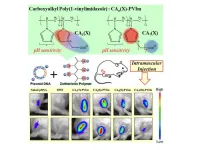(Press-News.org) Researchers in Australia have found that when women are given accurate information about a test that indicates the number of eggs in their ovaries, they have less interest in taking the test compared to women who viewed information available online.
The researchers initiated the study, which is published today (Monday) in Human Reproduction [1], one of the world’s leading reproductive medicine journals, because of the large amount of misleading and incorrect information promoted to women about the anti-Mullerian hormone (AMH) test on websites, including fertility clinic websites, and via social media.
AMH is measured by a blood test that is considered to give an indication of the number of eggs available in the ovaries of adult women, but not of the quality of these eggs. The test can be helpful in fertility treatment as it indicates the approximate number of eggs that can be retrieved for in vitro fertilisation (IVF) or egg freezing, but it cannot reliably predict the chances of conceiving or the specific age of menopause for individual women. For this reason, the American College of Obstetricians and Gynecologists strongly discourages AMH testing for women not seeking fertility treatment. However, Dr Tessa Copp, a post-doctoral research fellow at the School of Public Health, the University of Sydney, Australia, and other researchers have found that the AMH test is being promoted increasingly as a way for women to find out about their fertility and when they will go through menopause.
Dr Copp said: “Companies, including some accredited fertility clinics, are now selling the test direct to consumers, falsely promising women detailed insights into their fertility potential. We undertook this study due to seeing a plethora of false and misleading advertising by online companies and on social media, and hearing of friends who were tested for inappropriate reasons, thinking it was a test of their fertility, and who then subsequently made significant life changes based on the test result.”
Dr Copp and her colleagues in Australia and The Netherlands designed an online randomised controlled trial that ran between November and December 2022. They recruited 1004 women aged between 25-40 years, living in Australia or The Netherlands, who had never given birth, were not currently pregnant but would like to have a baby at some point and who had never had an AMH test. A total of 967 were included in the final analysis.
They randomly allocated the participants to receive one of two information pamphlets about the AMH test: 1) an evidence-based pamphlet that had been co-designed with the help of women, general practitioners, gynaecologists and the multi-disciplinary team running the trial; or 2) a pamphlet containing content from an existing website promoting the test direct to consumers in Australia (the control arm of the study). The pamphlets were available in English and Dutch.
After the women had been selected for the trial and randomised to view either the evidence-based information or the control information, the researchers asked them to complete a questionnaire in which they asked the women about their interest in having an AMH test; this was measured on a seven-point scale, 1 = ‘definitely NOT interested’ to 7 = ‘definitely interested’.
They also asked them about their intention to discuss the test with their doctor, their intention to have the test, their attitudes, knowledge, emotional response to the information, worry, anticipated psychological reaction to having an AMH test, anticipated impact on family planning and their satisfaction with the information.
The researchers found that those who had received the evidence-based information had less interest in having an AMH test. The mean average on the seven-point scale for this group was 3.87. Women who had viewed the information from an existing website had more interest, with a mean average of 4.93.
“Given that the mid-point of the scale is four, this means that the women given the evidence-based information were not interested, on average, in having an AMH test, while women in the control group were interested, on average,” said Dr Copp.
“Women who viewed the evidence-based information had a more accurate understanding of what the test could tell them. They also saw it as a less valuable test, and were less interested, on average, in discussing it with their doctor or getting tested, compared to the control group.
“These findings show that when enabled to make an informed decision through the provision of evidence-based information, women are not interested in getting an AMH test. This contrasts to previous studies showing women are interested in testing when uninformed of the test’s limitations. It illustrates the importance of ensuring women are fully informed about what the test can and cannot do.”
The researchers plan to disseminate the evidence-based information as widely as possible, to clinics, clinicians, companies and other organisations, and via social media.
“We hope the co-designed, evidence-based information developed in this study will help both clinicians and patients in navigating for whom, and in what circumstances, the test is useful,” she said.
“Clinics that provide misleading information are breaking codes of practice, such as the Reproductive Technology Accreditation Committee scheme in Australia, and should be held to account. Regulatory bodies need to do better at ensuring clinics are transparent and provide accurate information, and act against any parties promoting false and misleading information. We were concerned to find that women in the control group considered the misleading information to be trustworthy and balanced.”
This is the first study to co-design and test the efficacy of evidence-based information about the AMH test. A limitation is that the women were more highly educated than the general Australian and Dutch populations, and some measures, such as the influence of the test on family planning, were hypothetical.
(ends)
[1] “Women’s interest, knowledge, and attitudes relating to anti-Mullerian hormone testing: a randomized controlled trial”, by Tessa Copp et al. Human Reproduction journal. doi:10.1093/humrep/deae147
END
Evidence-based information combats misleading and false claims on the internet and social media about the anti-Mullerian hormone test
2024-07-29
ELSE PRESS RELEASES FROM THIS DATE:
Steel industry’s net zero drive could make lower-grade iron ore viable
2024-07-29
A decarbonised steel industry that includes carbon dioxide removal techniques in its net zero arsenal could use lower-grade iron ore, according to a new study.
Steel accounts for 5-8% of carbon dioxide emissions globally. Its total emissions have risen over the past decade, largely due to increased demand.
The International Energy Agency has stated that, without innovation, the scope to limit emissions is ‘limited’. Therefore, the commercialisation of new zero-emission production processes is critical.
Innovative ...
Plasma phosphorylated tau 217 and Aβ42/40 to predict early brain Aβ accumulation in people without cognitive impairment
2024-07-28
About The Study: The results of this cohort study suggest that combining plasma p-tau217 and Aβ42/40 levels could be useful for predicting development of Aβ pathology in people with early stages of subthreshold Aβ accumulation. These biomarkers might thus facilitate screening of participants for future primary prevention trials.
Corresponding Authors: To contact the corresponding authors, email Oskar Hansson, M.D, Ph.D. (Oskar.Hansson@med.lu.se) and Shorena Janelidze, Ph.D. (shorena.janelidze@med.lu.se).
To access the embargoed study: Visit our For The Media website at this link https://media.jamanetwork.com/
(doi:10.1001/jamaneurol.2024.2619)
Editor’s ...
MRI signature of α-synuclein pathology in asymptomatic stages and a memory clinic population
2024-07-28
About The Study: In this cohort study, seed amplification assays (SAA) α-syn+ was consistently associated with nucleus basalis of Meynert (NBM) atrophy already during asymptomatic stages. Further, in memory clinic cognitively impaired populations, SAA α-syn+ was associated with NBM atrophy, which partially mediated α-syn–induced attention/executive impairment.
Corresponding Authors: To contact the corresponding authors, email Laura E.M. Wisse, Ph.D. (laura.wisse@med.lu.se) and Oskar Hansson, M.D., Ph.D. (oskar.hansson@med.lu.se).
To access the embargoed study: Visit our For The Media website at this link https://media.jamanetwork.com/
(doi:10.1001/jamaneurol.2024.2713)
Editor’s ...
Blood biomarkers to detect Alzheimer disease in primary care and secondary care
2024-07-28
About The Study: The amyloid probability score 2 (APS2) blood test and percentage of p-tau217 alone had high diagnostic accuracy for identifying Alzheimer disease among individuals with cognitive symptoms in primary and secondary care using predefined cutoff values. Future studies should evaluate how the use of blood tests for these biomarkers influences clinical care.
Corresponding Authors: To contact the corresponding authors, email Sebastian Palmqvist, M.D., Ph.D. (sebastian.palmqvist@med.lu.se) and Oskar Hansson, M.D., Ph.D. (oskar.hansson@med.lu.se).
To access the embargoed study: Visit our For The Media website at this link https://media.jamanetwork.com/
(doi:10.1001/jama.2024.13855)
Editor’s ...
Changes in Alzheimer disease blood biomarkers and associations with incident all-cause dementia
2024-07-28
About The Study: Plasma biomarkers of Alzheimer disease (AD) neuropathology, neuronal injury, and astrogliosis increase with age and are associated with known dementia risk factors. AD-specific biomarkers’ association with dementia starts in midlife whereas late-life measures of AD, neuronal injury, and astrogliosis biomarkers are all associated with dementia.
Corresponding Author: To contact the corresponding author, Priya Palta, Ph.D., M.H.S., email priya_palta@med.unc.edu.
To access the embargoed study: Visit our For The Media website at this link https://media.jamanetwork.com/
(doi:10.1001/jama.2024.6619)
Editor’s ...
New and improved drug delivery molecules for skeletal muscle
2024-07-27
Tokyo, Japan – Researchers from Tokyo Metropolitan University have created a new drug delivering molecule, a zwitterionic polymer complex that can help get plasmid DNA inside cells when injected into skeletal muscle, a crucial step in the expression of therapeutic RNA and proteins. The new compound effectively bound to plasmid DNA without affecting its structure. Injected into mouse muscles, the team observed widespread gene expression, promising applications to treatments of serious muscle diseases.
Drug delivery systems underpin many of the clinical breakthroughs of our age. For example, ...
UC San Diego Health ends negotiations with Tri-City Medical Center Healthcare District
2024-07-27
UC San Diego Health has ended more than nine months of negotiations for a potential partnership with the Tri-City Medical Center (TCMC) Healthcare District.
A final revised offer was presented to the TCMC Healthcare District on July 24 and no agreement was reached.
Highlights of the final proposal for TCMC included a financial recovery and growth plan that included:
$100 million infusion of cash within the first two years plus other financial supports, including a line of credit designed to protect the financial stability of TCMC during the first five years.
All assets and liabilities would transfer to UC San Diego Health, including employment ...
MLB add lifesavers to the chain of survival in New York City
2024-07-27
NEW YORK CITY, July 26, 2024 — The American Heart Association and Major League Baseball (MLB) brought cardiopulmonary resuscitation (CPR) and automated external defibrillator (AED) training to MLB staff at the New York headquarters office located on Avenue of the Americas on Monday, July 22. Nearly 100 employees attended to learn the lifesaving skills building confidence and capabilities to respond in the event of a cardiac emergency. According to American Heart Association data, nine out of every ten people who experience cardiac arrest outside of a hospital die, in part because they do not receive immediate CPR more than half of the time. CPR, especially if performed ...
ISU studies explore win-win potential of grass-powered energy production
2024-07-27
AMES, Iowa – Strategically planting perennial grass throughout corn and soybean fields helps address the unintended environmental consequences of growing the dominant row crops, including soil erosion, fertilizer runoff and greenhouse gas emissions.
But converting portions of farmland back to prairie has to make financial sense for farmers, which is why a research team led by Iowa State University landscape ecologist Lisa Schulte Moore has spent the past six years studying how to efficiently turn harvested ...
Study identifies biomarker that could predict whether colon cancer patients benefit from chemotherapy
2024-07-27
MIAMI, FLORIDA (July 25, 2024) – Many people with stage II or III colon cancer receive additional, or adjuvant, chemotherapy following surgery. However, clinical trials have shown that this treatment doesn’t improve the chances of survival for every patient. A study published July 25 in Cell Reports Medicine identifies and validates a 10-gene biomarker that potentially predicts whether a stage II or III colon cancer patient will benefit from adjuvant chemotherapy.
A secondary finding from the study could also lead to further research and application. Researchers found that the gene signature could potentially also predict ...





